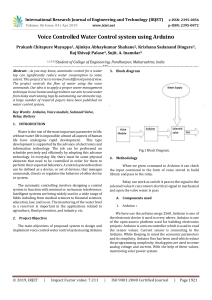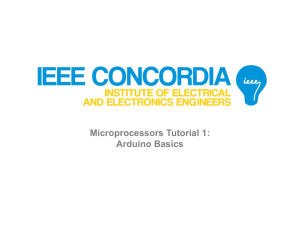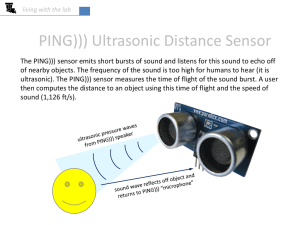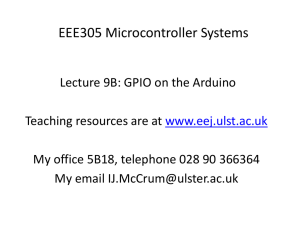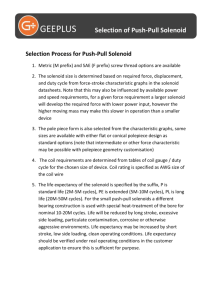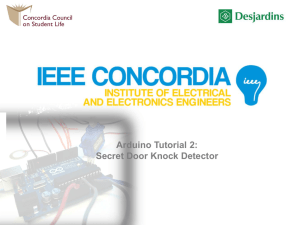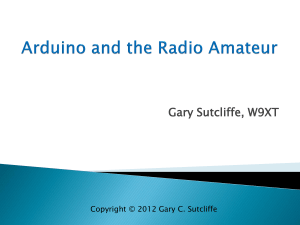solenoid valve - Louisiana Tech University
advertisement
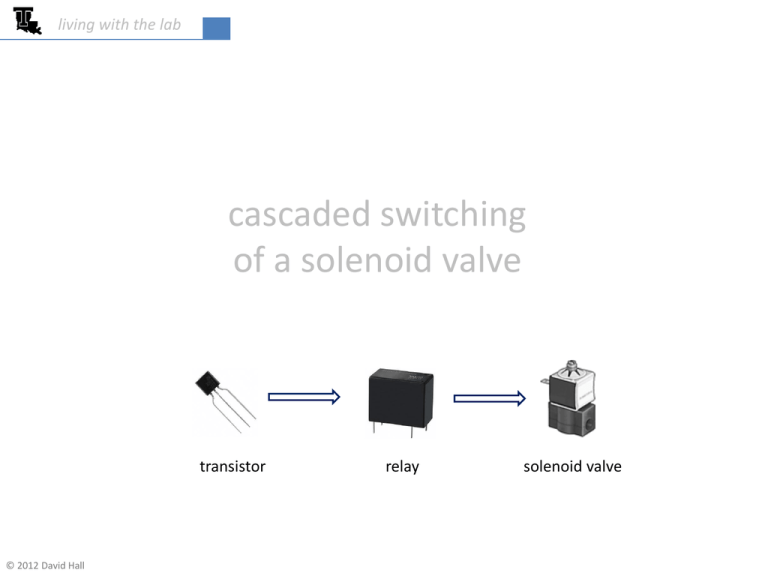
living with the lab
cascaded switching
of a solenoid valve
transistor
© 2012 David Hall
relay
solenoid valve
living with the lab
DISCLAIMER & USAGE
The content of this presentation is for informational purposes only and is intended only for students
attending Louisiana Tech University.
The author of this information does not make any claims as to the validity or accuracy of the information
or methods presented.
Any procedures demonstrated here are potentially dangerous and could result in injury or damage.
Louisiana Tech University and the State of Louisiana, their officers, employees, agents or volunteers, are
not liable or responsible for any injuries, illness, damage or losses which may result from your using the
materials or ideas, or from your performing the experiments or procedures depicted in this presentation.
If you do not agree, then do not view this content.
The copyright label, the Louisiana Tech logo, and the “living with the lab” identifier should not be removed
from this presentation.
You may modify this work for your own purposes as long as attribution is clearly provided.
2
living with the lab
wiring
setting digital output on Arduino HIGH switches the transistor
the transistor allows current to flow through the relay coil, closing the relay contacts
power from the 12VDC supply actuates the solenoid valve, allowing water to flow
5V
Arduino
digital pin
12VDC
power
supply
C
B
1kΩ
+
•
•
•
diodes
-
E
coil
normally open
contacts
SPST relay
solenoid valve
3
living with the lab
good and bad wiring: using a flyback diode
5V
5V
C
1kW
Arduino
digital pin
B
Arduino
digital pin
B
C
1kW
E
E
4
living with the lab
why do we need a flyback diode
• when digital pin 8 on the Arduino goes HIGH, electricity is conducted
through the coil of the relay, inducing a magnetic field in the coil
5V
• energy is stored in the coil as a magnetic field
• when digital pin 8 on the Arduino goes LOW, the decay of the magnetic
field induces a current that can be harmful to our electronics (can arc
across contacts or send a surge through the system)
• the diode allows a circular current to be set up in the coil / diode loop so
that the magnetic energy stored in the coil can be safely dissipated
Arduino
digital pin
C
B
1kW
current path broken
E
void setup() {
pinMode(8,OUTPUT);
}
void loop() {
digitalWrite(8, HIGH);
delay(500);
digitalWrite(8, LOW);
delay(2000);
}
5
living with the lab
power considerations
1. Power to switch transistor
source: Arduino digital I/O pin
max current per digital I/O pin: 40 mA
2. Power to switch relay
source: 5V from Arduino (from the on-board voltage regulator)
max current from the voltage regulator: 800 mA
coil current for relay: 40 mA
3. Power to switch solenoid valve
source: 12VDC wall power supply (converts AC to DC)
max current of power supply: 1.5A (depends on power supply purchased)
requirements of solenoid valve: 0.29A
6
living with the lab
implementation
void setup() {
pinMode(8,OUTPUT);
}
void loop() {
digitalWrite(8, HIGH);
delay(500);
digitalWrite(8, LOW);
delay(2000);
}
wire to digital pin 8
12V
5V
silver stripe toward
positive side
solenoid
valve
7
living with the lab
more compact wiring
you will need three relays, two for the
solenoid valves and one for the heater
transistors turned with
round side toward relays
8
living with the lab
view from other side of relays
stripes on diodes
must point toward
positive voltage
9
living with the lab
another view
10
living with the lab
complete assembly of conductivity control system
(in class or for homework, as time permits)
11
